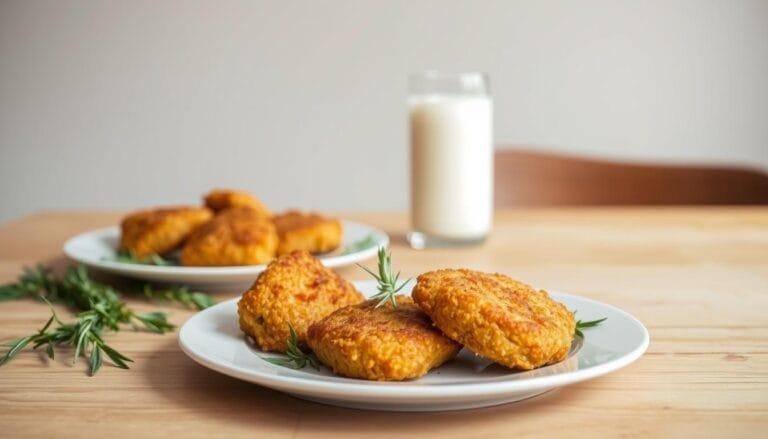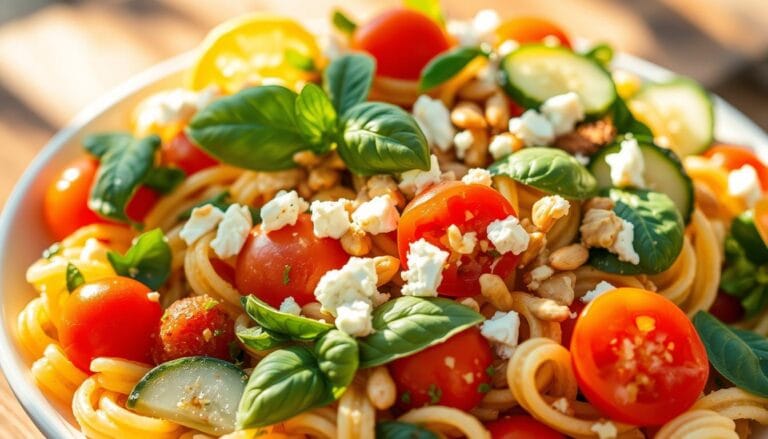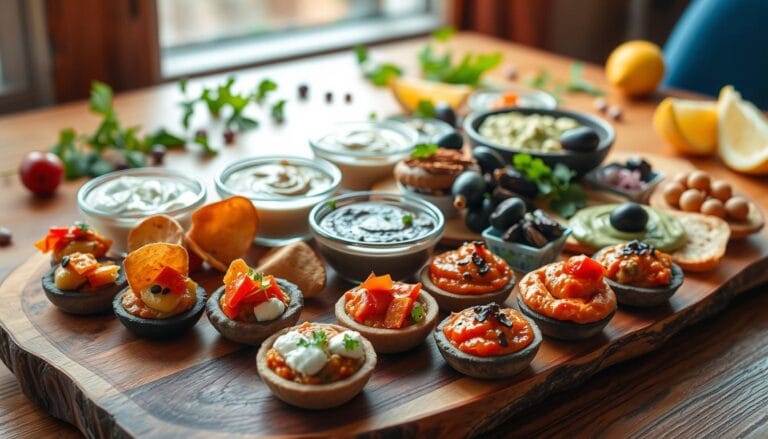Delicious Creamy Vegan Ricotta-3 Simple Ways to Make
Table of Contents
3 Simple Ways to Make Creamy Vegan Ricotta
I remember the day I found out you can make vegan ricotta just as creamy as the real thing. I love cooking and wanted to eat healthier. Making vegan ricotta was my fun journey in the kitchen. Your kitchen is about to become a place where plant-based cheese magic happens!
Making dairy-free ricotta is more than a trend; it’s a tasty change. If you can’t eat dairy, are vegan, or just want to try something new, these three ways will amaze you. You’ll make creamy vegan ricotta that’s so smooth, it will wow your taste buds.
You can use cashews, tofu, or almonds to make this creamy vegan ricotta. It’s easy to make with simple ingredients and quick prep. Get ready to learn three easy ways to make this delicious dairy-free ricotta. Your cooking will get better, and you’ll satisfy your cheese cravings.
Key Takeaways
- Vegan ricotta can be made with multiple plant-based ingredients
- Preparation time is typically under 15 minutes
- Homemade dairy-free ricotta can be stored for up to 4 days
- Multiple base ingredients offer flavor and texture variations
- Nutritional yeast helps create an authentic cheese-like taste
What is Vegan Ricotta?
Vegan ricotta is a tasty, plant-based cheese substitute. It turns traditional dairy ricotta into a creamy, healthy spread. This homemade vegan ricotta is a great choice for those looking for dairy-free options.
This vegan cheese alternative can be made from different plant-based ingredients. Each ingredient adds its own special touch to the final product. The most common bases are:
- Nuts (cashews, almonds)
- Seeds (sunflower, hemp)
- Legumes (tofu, soybeans)
- Plant-based milks (pea, almond, soy)
Exploring Plant-Based Alternatives
When you make homemade vegan ricotta, you can try out different ingredients. Nuts give it a creamy texture, while tofu adds protein. You can adjust the recipe to fit your diet and taste.
Nutritional Benefits of Vegan Ricotta
Vegan ricotta is often better for you than traditional ricotta. It usually has:
- Less saturated fat
- More plant-based protein
- No cholesterol
- More essential nutrients
Choosing vegan ricotta is not just about taste. It’s also a healthier and kinder choice for our planet.
Basic Ingredients for Vegan Ricotta
Making a tasty vegan ricotta recipe begins with knowing the main ingredients. These are the things that turn simple plant-based parts into a creamy, tasty substitute. You can make your own vegan ricotta using a mix of nuts, seeds, legumes, and spices.
Let’s look at the key parts that make vegan ricotta a tasty and flexible choice instead of traditional dairy ricotta:
Nuts, Seeds, and Legumes
The base of most vegan ricotta recipes is made from protein-rich ingredients:
- Cashews: They’re creamy and mild, giving a smooth texture
- Almonds: They add a subtle nutty taste
- Tofu: It’s packed with protein and has a neutral taste
- White beans: They make the ricotta soft and spreadable
Seasonings and Flavor Enhancements
To make your vegan ricotta even better, try these flavor-boosting ingredients:
| Ingredient | Quantity | Purpose |
|---|---|---|
| Nutritional Yeast | 1/4 cup | Adds cheesy flavor |
| Lemon Juice | 1.5 tablespoons | Provides tanginess |
| Garlic | 1 clove | Enhances savory notes |
| Italian Dry Seasoning | 1 tablespoon | Adds herbal complexity |
Pro tip: Fresh, high-quality ingredients are key for making a real and tasty vegan ricotta substitute. Try different mixes to find your favorite.
Method 1: Cashew-Based Vegan Ricotta
Creating the best vegan ricotta cheese starts with understanding the magic of cashews. These versatile nuts transform into a creamy, delicious vegan ricotta cheese. It will revolutionize your plant-based cooking.
Soaking the Cashews: The Secret to Smooth Texture
Preparing vegan ricotta cheese begins with proper cashew preparation. You’ll want to soak your cashews to achieve ultimate creaminess. Here are two quick methods:
- Overnight soak: Cover cashews in water and let sit for 6-8 hours
- Quick soak: Boil cashews for 10-15 minutes until softened
Blending for Perfect Creaminess
Transforming soaked cashews into smooth vegan ricotta cheese requires a powerful blender. Blend your softened cashews with these key ingredients:
- Nutritional yeast
- Garlic powder
- Lemon juice
- Salt
- Water or plant-based milk
Ideal Uses for Cashew Ricotta
Your homemade vegan ricotta cheese can elevate multiple dishes. Try spreading it on:
- Lasagna layers
- Stuffed shells
- Toast
- Pizza
- Vegetable stuffings
With just a few simple steps, you’ll create a delicious vegan ricotta cheese. It rivals traditional dairy versions. Experiment with your favorite herbs and seasonings to make it uniquely yours!
Method 2: Tofu Vegan Ricotta
Making vegan ricotta from tofu is a big deal in plant-based cooking. It turns simple stuff into a creamy, flexible mix that tastes and feels like real ricotta.
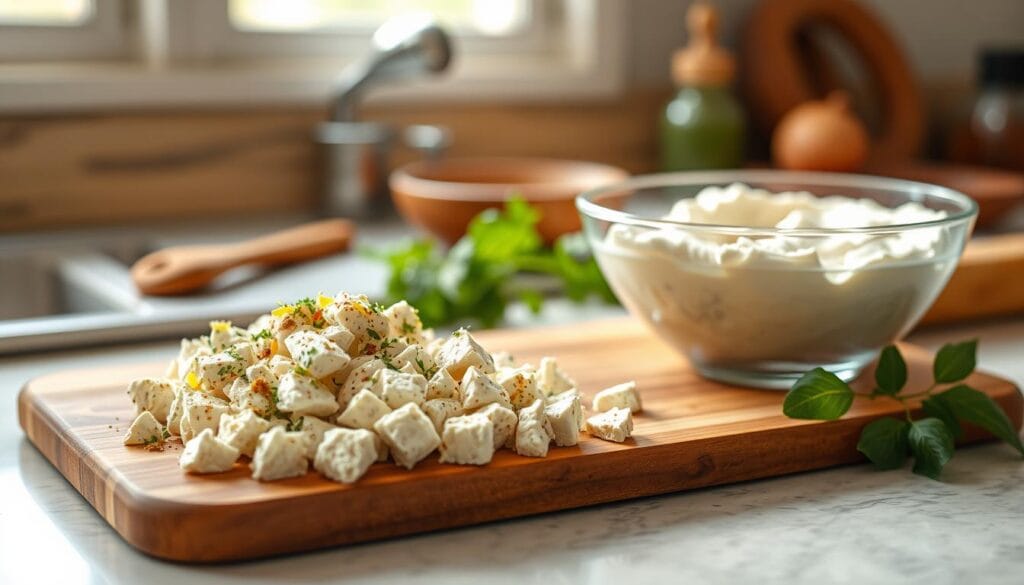
Choosing the Right Tofu
For the best vegan ricotta, pick extra-firm tofu. Its firmness makes a smooth spread that’s just like traditional ricotta. Make sure to drain and press the tofu well to get rid of extra water.
- Extra-firm tofu works best
- Drain completely before use
- Press tofu for 15-20 minutes
Mixing Ingredients for Texture
To get the right texture for your dairy-free ricotta, blend ingredients carefully. Use a food processor to mix tofu with nutritional yeast, lemon juice, and spices. This will give you a ricotta-like feel.
| Ingredient | Quantity |
|---|---|
| Extra-firm tofu | 14 oz (397g) |
| Nutritional yeast | 1/4 cup |
| Lemon juice | 2 tbsp |
| Garlic | 2 cloves |
| Salt | 1.5 tsp |
Delicious Recipes Featuring Tofu Ricotta
Your homemade vegan ricotta can make many dishes better. Try it on toast, in lasagna, stuffed in pasta shells, or as a tasty ricotta dip for veggies.
Pro tip: Keep your dairy-free ricotta in an airtight container in the fridge. It keeps for up to 5 days, making meal prep easy.
Method 3: Almond-Based Vegan Ricotta
Almonds are a great choice for making vegan ricotta. This cheese alternative is creamy and packed with nutrients. It’s perfect for many recipes.
The Power of Almonds in Vegan Cheese
Almonds make vegan ricotta special. They add richness and health benefits. Here’s what you get:
- High protein content
- Healthy monounsaturated fats
- Smooth, creamy texture
- Versatile flavor profile
Blending Techniques for Smooth Perfection
To make almond ricotta, blending is key. Use a high-speed blender. Follow these steps:
- Soak almonds overnight (minimum 6 hours)
- Drain and rinse thoroughly
- Blend in short 30-second intervals
- Scrape down sides between blending cycles
- Add water gradually for desired consistency
Culinary Applications for Almond Ricotta
Almond ricotta can make many dishes better. Try spreading it on toast, using it in lasagna, or as a creamy base for pizza. It’s a must-have for those who love plant-based cooking.
Pro tip: For enhanced flavor, add nutritional yeast or fresh herbs during blending.
This almond ricotta has 162 calories per serving and 6.3 grams of protein. It’s tasty and healthy. Store it in an airtight container for up to 5 days. Enjoy your homemade vegan cheese!
Common Mistakes When Making Vegan Ricotta
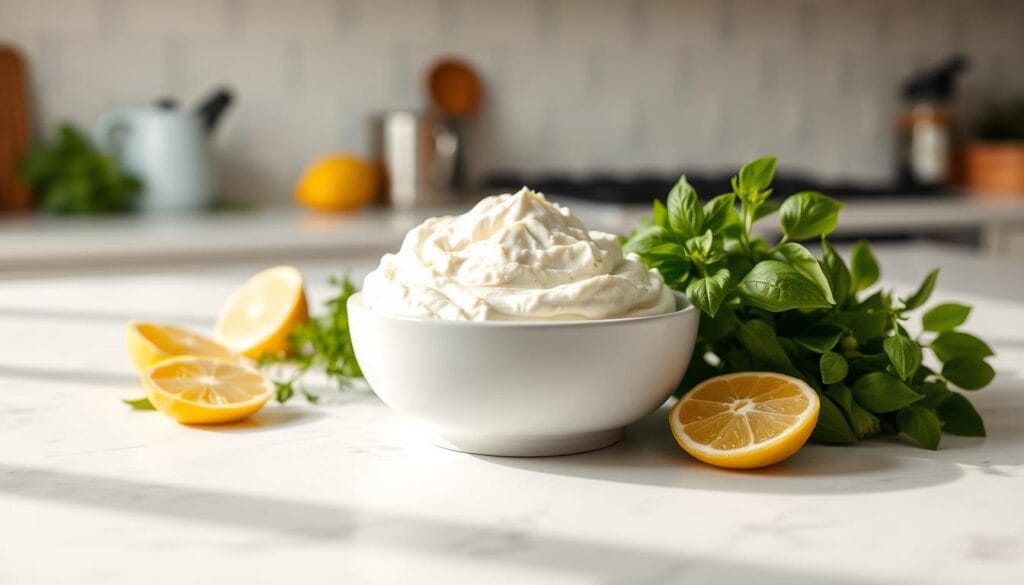
Making vegan ricotta at home can be tricky. Many people struggle to get the creamy texture they want. Knowing the common mistakes can help you make a great vegan ricotta.
Over-Processing Ingredients
One big mistake is blending too much. Over-blending can ruin the texture of your ricotta. You want it smooth but still a bit grainy, like traditional ricotta.
- Pulse ingredients instead of continuous blending
- Stop mixing when you reach a creamy but textured consistency
- Use short bursts in your food processor
“The key to perfect vegan ricotta is knowing when to stop blending.” – Plant-Based Cooking Expert
Skipping Essential Seasonings
A bland vegan ricotta is a disappointment. Seasonings are key to a rich flavor. Without them, your ricotta might taste dull.
- Add nutritional yeast for cheesy flavor
- Include salt to enhance overall taste
- Experiment with herbs like basil or oregano
- Consider garlic powder for extra complexity
Avoiding these mistakes will help you make a tasty vegan ricotta. Remember, practice makes perfect. Don’t worry if your first try isn’t perfect.
Flavor Variations for Vegan Ricotta
Turning your vegan ricotta into a masterpiece is simple. Try adding herbs, spices, and zesty ingredients. This way, you’ll make the best vegan ricotta that will make your dishes pop.
Herb-Infused Vegan Ricotta Options
Adding fresh herbs to your vegan ricotta can really boost its taste. Here are some great herb mixes to try:
- Basil Blend: Mix in chopped fresh basil for a taste of Italy
- Rosemary Richness: Add finely chopped rosemary for a deep, earthy flavor
- Thyme Delight: Sprinkle in dried or fresh thyme for a unique taste
Adding Garlic and Lemon Zest
Garlic and lemon zest can make your vegan ricotta stand out. Garlic adds a strong, savory taste. Lemon zest brings a bright, citrusy flavor that balances the creaminess.
- Grate fresh garlic cloves for a bold flavor
- Use a microplane zester for fine lemon zest
- Start with a little and adjust to taste
By trying these flavor mixes, you’ll make a versatile vegan ricotta. It will add depth and complexity to pasta dishes, spreads, and appetizers.
Storage Tips for Vegan Ricotta
Storing your vegan ricotta right is key to keeping it fresh and tasty. Whether you made it from cashews, tofu, or almonds, the right storage keeps it creamy and flavorful.
Storing your vegan ricotta needs some care to keep it fresh. Here are some tips to help you enjoy your dairy-free ricotta for longer:
Refrigeration Best Practices
- Store your vegan ricotta in an airtight container
- Keep refrigerated at 40°F (4°C) or below
- Consume within 5-7 days for optimal taste and texture
- Always use clean utensils when scooping to prevent contamination
Freezing Considerations
Freezing vegan ricotta needs some thought. Not all types freeze the same:
- Cashew-based ricotta freezes better than tofu-based
- Texture might change a bit when thawed
- Use frozen ricotta within 1 month for best quality
“Freshness is key when it comes to vegan ricotta – the shorter the storage time, the better the taste and texture.”
Pro tip: Make smaller batches of vegan ricotta to keep it fresh. Your dairy-free ricotta will appreciate it!
Serving Suggestions for Vegan Ricotta
Your plant-based ricotta is a versatile ingredient that can transform multiple dishes. It’s perfect for a creamy spread or a delectable filling. This vegan ricotta substitute offers endless culinary possibilities.
Creative Pasta Dish Pairings
Vegan ricotta shines brightest in Italian-inspired dishes. Here are exciting ways to use your homemade plant-based ricotta:
- Lasagna layers with spinach and marinara sauce
- Stuffed shells topped with fresh herbs
- Ravioli filling with roasted vegetables
Delightful Bread and Toast Options
Spread your vegan ricotta substitute on various breads for a quick and nutritious meal. The creamy texture pairs wonderfully with different toppings:
- Multi-grain toast with lemon zest
- Sourdough topped with fresh basil
- Whole wheat bread with roasted cherry tomatoes
| Serving Option | Calories per Serving | Protein (g) |
|---|---|---|
| Pasta Filling | 162 | 6.3 |
| Toast Spread | 130 | 4.5 |
Experiment with your vegan ricotta to discover unique flavor combinations that suit your taste preferences. The key is to be creative and enjoy the process!
Conclusion: Embrace Vegan Ricotta in Your Meals
Starting your journey with homemade vegan ricotta opens up a world of creativity in cooking. Vegan ricotta lets you make old recipes new again, all while being kinder to the planet. It’s perfect for those trying plant-based diets or looking for healthier options.
Learning to make vegan ricotta lets you try out different ingredients like cashews, tofu, and almonds. Each one gives you a unique taste and texture. This shows how people are moving towards eating more mindfully and caring for the environment.
With just a little time and effort, vegan ricotta becomes a fun cooking project. You’ll find that cooking with plants can be tasty and good for you. Try out different ingredients and make vegan ricotta a key part of your cooking. It will add excitement and new ideas to your meals.



